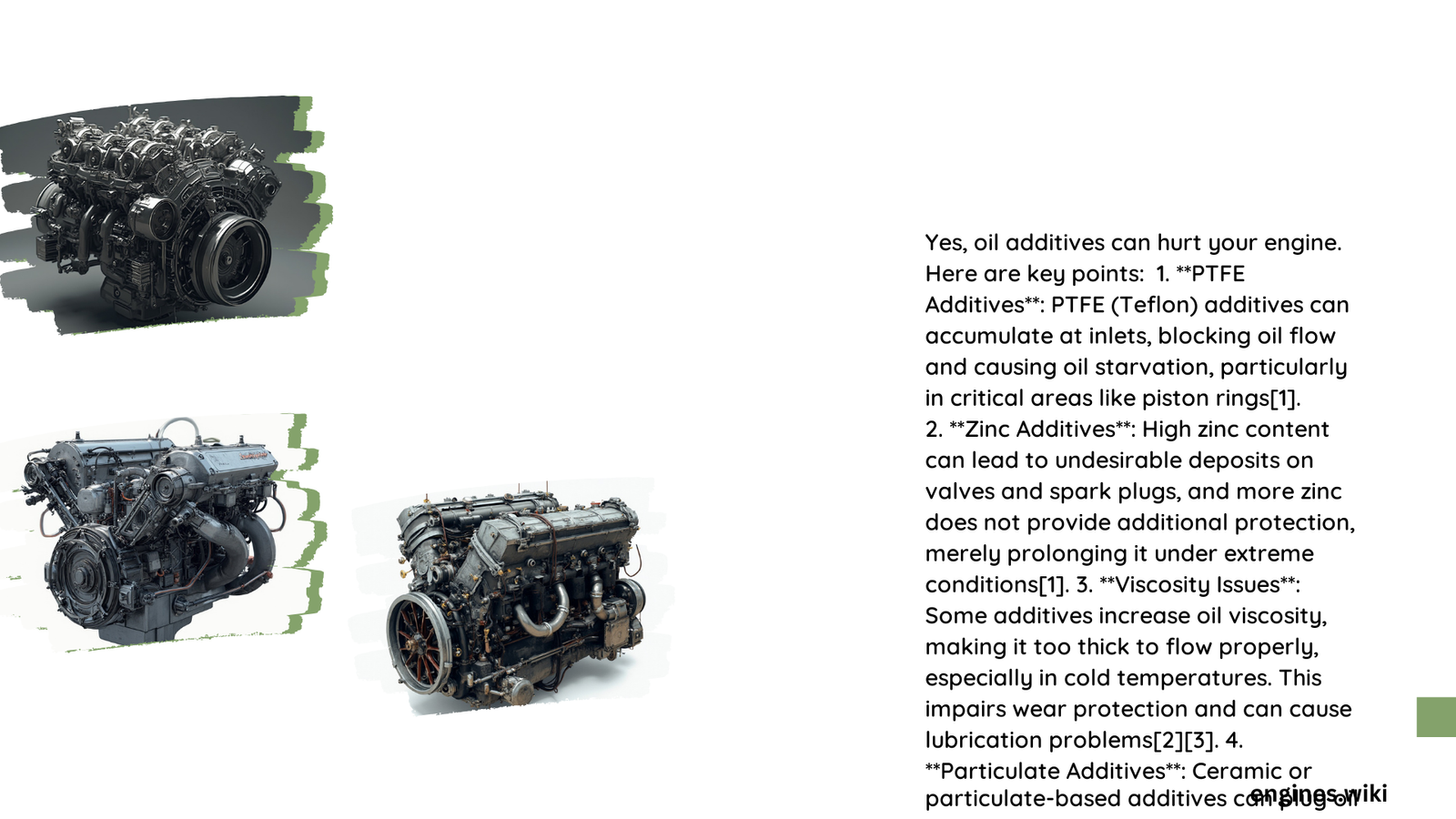Oil additives are marketed as performance enhancers for engines, but they can potentially cause more harm than good. While some additives may offer benefits, others can lead to engine damage, reduced performance, and increased wear. This article explores the potential risks of using oil additives and provides insights into their effects on engine health and longevity.
What Are the Potential Risks of Using Oil Additives?
Oil additives can pose several risks to your engine:
- Chemical incompatibility with existing oil
- Clogging of oil passages and filters
- Increased engine wear
- Reduced lubricating properties
- Damage to catalytic converters
- Voiding of manufacturer warranties
Let’s delve deeper into these risks and examine the specific ways oil additives can harm your engine.
How Can Certain Chemical Compositions in Oil Additives Damage My Engine?

Some oil additives contain chemicals that can be detrimental to your engine’s health. Here are a few examples:
PTFE (Polytetrafluoroethylene)
PTFE, commonly known as Teflon, is a solid substance that doesn’t melt at engine operating temperatures. When added to oil, it can:
- Accumulate at oil inlets, blocking oil flow
- Cause oil starvation in critical engine components
- Lead to increased wear on piston rings and other moving parts
High Zinc Content
While zinc is beneficial in small amounts, excessive zinc in oil additives can:
- Form deposits on valves and spark plugs
- Damage catalytic converters
- Cause premature engine wear
Solvents
Some additives contain solvents like kerosene, naphthalene, or acetone. These can:
- Dilute the oil, reducing its lubricating properties
- Increase engine wear and tear
- Potentially cause seal and gasket damage
What Does Scientific Research Say About Oil Additives and Engine Damage?
Scientific studies have provided valuable insights into the effects of oil additives on engines:
NASA Lewis Research Center Study
A study conducted by NASA found that:
- PTFE-containing additives offered no benefits
- In some cases, these additives had detrimental effects
- Solids in the oil accumulated at inlets, blocking oil flow
Comparative Engine Test
In a controlled experiment:
- Two engines were run for 20 hours
- One engine used an oil additive, the other didn’t
- The engine with the additive showed:
- Heavy cylinder bore damage
- Scored crankpin bearings
- The untreated engine showed no such damage
These studies highlight the potential risks associated with using certain oil additives.
Are Oil Additives Compatible with Synthetic Oils?
The compatibility of oil additives with synthetic oils is a concern for many vehicle owners. Here’s what you need to know:
- Synthetic oils are carefully formulated with balanced additive packages
- Adding aftermarket additives can disrupt this balance
- This disruption may reduce the protective effects of the synthetic oil
It’s generally recommended to avoid using additional additives with synthetic oils, as they can interfere with the oil’s performance and potentially cause harm to your engine.
What Are the Documented Risks of Using Synthetic Oil Additives?
Using synthetic oil additives can lead to several issues:
- Increased engine wear rates
- Accelerated oil breakdown
- Clogged oil filters
- Corrosion due to excessive anti-foaming additives
- Deposits on valves and spark plugs from high zinc content
These risks underscore the importance of sticking to manufacturer-recommended oils and maintenance schedules.
How Can I Protect My Engine Without Using Aftermarket Oil Additives?
To maintain your engine’s health without resorting to potentially harmful additives:
- Use high-quality oil recommended by your vehicle manufacturer
- Follow the recommended oil change intervals
- Use OEM or equivalent oil filters
- Keep up with regular maintenance schedules
- Address any engine issues promptly
By following these guidelines, you can ensure optimal engine performance and longevity without the risks associated with aftermarket oil additives.
Conclusion
While oil additives may promise enhanced engine performance, the potential risks often outweigh the benefits. From chemical incompatibilities to increased wear and tear, these additives can cause significant damage to your engine. Instead of relying on aftermarket products, stick to manufacturer recommendations and regular maintenance to keep your engine running smoothly and efficiently.
Remember, when it comes to your engine’s health, it’s better to err on the side of caution and avoid potentially harmful additives.
References:
1. https://bobistheoilguy.com/forums/threads/the-trouble-with-oil-additives.19470/
2. https://blog.amsoil.com/more-than-you-ever-wanted-to-know-about-motor-oil-additives/
3. https://66nissan.com/blog/about-engine-oil-additives/
